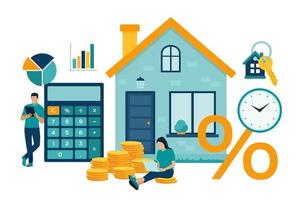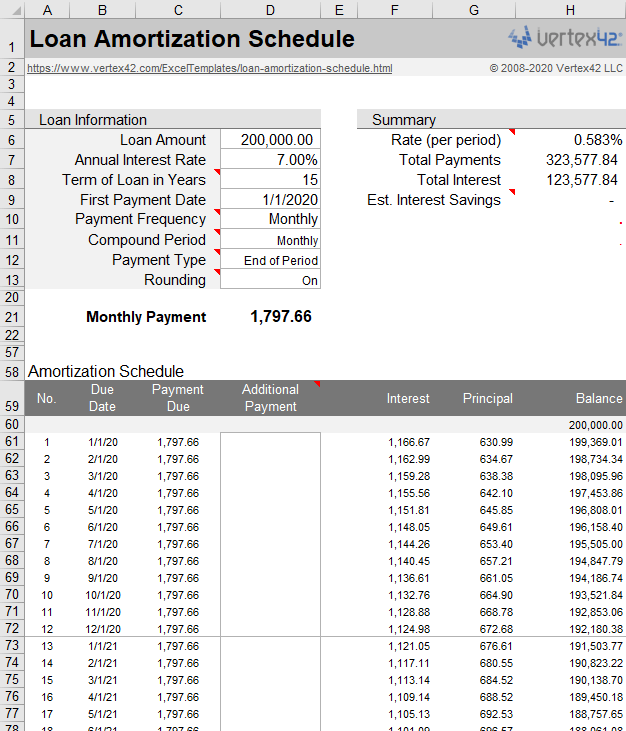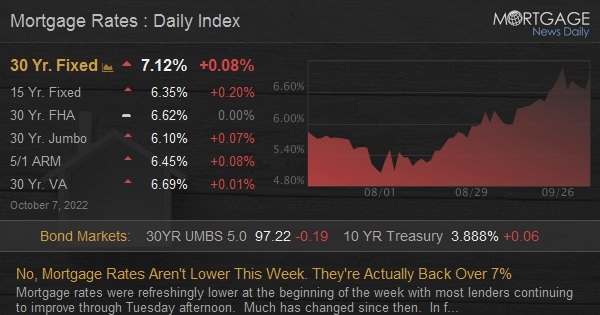
There are many factors to consider when deciding whether you want to get a loan or a home equity credit line. These factors include tax perks, terms, and interest rates. You should also be familiar with the terms and fees of your lender. It comes down ultimately to your personal circumstances and how you view the situation.
Tax perks
A home equity line is a loan that can help you finance repairs and improvements to your primary house. As long as the loan amount is higher than the standard deduction, it is tax-deductible. However, you should consult a tax advisor before making any decisions.
Tax perks of a home equity loan include low interest rates. In many cases, interest on your home equity loan can be deducted. Although the standard deduction for a household of one is quite generous, it's not necessary to include all your deductions if you have a large loan.
Interest rates
You should consider your financial situation when deciding between a loan and a home equity credit line of credit. If you need to borrow money specifically for a purpose, a home Equity Line of Credit may be the best choice. These loans are generally long-term loans that are based on the home's worth. A loan with a lower rate may be more suitable for you if you have a good credit rating.

Although the interest rates for home equity loans and line of credit are very similar, there is one thing that sets them apart: the Annual Percentage Rat (APR). The APR refers to the annual interest you will pay on the loan. The lower your APR, the more advantageous. The APR is calculated by adding the interest rate (one percent) and points (one percentage of the loan amount). These numbers can be used to compare offers.
Lenders' terms
The interest rate is one of the most important differences between a loan and a home equity credit line of credit. A home equity loan's interest rate is adjustable and can change over the course of the loan. The rate is linked to an independent benchmark such as the U.S. Prime Rate, which was 3.5 percent as of the time of this article. In addition to the variable rate, the lender will also charge a margin, or profit margin, on the interest rate. These are important factors to consider if you want to get the best interest rate.
Lenders may vary in the terms and rates of a loan or home equity line credit. Before signing any documents or entering into any agreement, prospective borrowers should be sure to fully understand the terms. It is important to consider how much money you need and how it will be used. Consider the interest rate, monthly payment, and tax benefits of a home equity credit line.
Revolving credit line
A home equity loan can help you finance a major purchase, or pay monthly bills. These loans are structured in the same way as credit cards but have different features. The home equity loan is often offered at lower interest rates, and has more flexible repayment terms. These attractive features make home equity loans a good option for consolidating debt. A home equity line credit also allows you to access more money than traditional home equity loans.
Both have their advantages and disadvantages. The difference between a loan for home equity and a line of credit for home equity is the interest rates. A home equity loan is secured by the equity in your property. The money is not due until you use it. Home equity lines of credit allow you to borrow up to the amount that you need and make monthly payments as needed. Home equity loans typically have lower interest rates that credit cards. Additionally, interest on home equity loans can often be tax-deductible.

Liquidity
A home equity credit is a loan that is based upon the home's worth. It can be used for house improvements, education expenses, and unexpected costs. A line of credit offers the benefit of only paying interest on what you use. You can access it at any time you need it. It is easier to repay. A home equity credit line has many benefits.
A home equity credit line is similar to a credit card. It allows you access to a limited amount of money that you can use as necessary during the draw period. However, you can never use all funds. You cannot withdraw money at any point during the draw period. Additionally, your payments may fluctuate. To make an informed decision, you should carefully review the terms and conditions of each product.
FAQ
What should I do before I purchase a house in my area?
It depends on the length of your stay. Save now if the goal is to stay for at most five years. But if you are planning to move after just two years, then you don't have to worry too much about it.
What are the cons of a fixed-rate mortgage
Fixed-rate mortgages tend to have higher initial costs than adjustable rate mortgages. You may also lose a lot if your house is sold before the term ends.
How much will my home cost?
This varies greatly based on several factors, such as the condition of your home and the amount of time it has been on the market. The average selling price for a home in the US is $203,000, according to Zillow.com. This
How can you tell if your house is worth selling?
Your home may not be priced correctly if your asking price is too low. Your asking price should be well below the market value to ensure that there is enough interest in your property. You can use our free Home Value Report to learn more about the current market conditions.
Should I buy or rent a condo in the city?
Renting could be a good choice if you intend to rent your condo for a shorter period. Renting can help you avoid monthly maintenance fees. However, purchasing a condo grants you ownership rights to the unit. You can use the space as you see fit.
Statistics
- The FHA sets its desirable debt-to-income ratio at 43%. (fortunebuilders.com)
- When it came to buying a home in 2015, experts predicted that mortgage rates would surpass five percent, yet interest rates remained below four percent. (fortunebuilders.com)
- Over the past year, mortgage rates have hovered between 3.9 and 4.5 percent—a less significant increase. (fortunebuilders.com)
- Based on your credit scores and other financial details, your lender offers you a 3.5% interest rate on loan. (investopedia.com)
- Private mortgage insurance may be required for conventional loans when the borrower puts less than 20% down.4 FHA loans are mortgage loans issued by private lenders and backed by the federal government. (investopedia.com)
External Links
How To
How to Manage a Rental Property
You can rent out your home to make extra cash, but you need to be careful. We'll help you understand what to look for when renting out your home.
Here's how to rent your home.
-
What are the first things I should consider? You need to assess your finances before renting out your home. If you have outstanding debts like credit card bills or mortgage payment, you may find it difficult to pay someone else to stay in your home while that you're gone. Also, you should review your budget to see if there is enough money to pay your monthly expenses (rent and utilities, insurance, etc. It might not be worth the effort.
-
What is the cost of renting my house? There are many factors that go into the calculation of how much you can charge to let your home. These factors include the location, size and condition of your home, as well as season. You should remember that prices are subject to change depending on where they live. Therefore, you won't get the same rate for every place. Rightmove reports that the average monthly market price to rent a one-bedroom flat is around PS1,400. This means that if you rent out your entire home, you'd earn around PS2,800 a year. That's not bad, but if you only wanted to let part of your home, you could probably earn significantly less.
-
Is it worth it. There are always risks when you do something new. However, it can bring in additional income. Before you sign anything, though, make sure you understand exactly what you're getting yourself into. You will need to pay maintenance costs, make repairs, and maintain the home. Renting your house is not just about spending more time with your family. Before signing up, be sure to carefully consider these factors.
-
Are there any advantages? It's clear that renting out your home is expensive. But, you want to look at the potential benefits. There are plenty of reasons to rent out your home: you could use the money to pay off debt, invest in a holiday, save for a rainy day, or simply enjoy having a break from your everyday life. You will likely find it more enjoyable than working every day. If you plan well, renting could become a full-time occupation.
-
How do I find tenants? After you have decided to rent your property, you will need to properly advertise it. Online listing sites such as Rightmove, Zoopla, and Zoopla are good options. After potential tenants have contacted you, arrange an interview. This will help you evaluate their suitability as well as ensure that they are financially secure enough to live in your home.
-
What can I do to make sure my home is protected? If you're worried about leaving your home empty, you'll need to ensure you're fully protected against damage, theft, or fire. Your landlord will require you to insure your house. You can also do this directly with an insurance company. Your landlord may require that you add them to your additional insured. This will cover any damage to your home while you are not there. However, this doesn't apply if you're living abroad or if your landlord isn't registered with UK insurers. In such cases, you will need to register for an international insurance company.
-
Sometimes it can feel as though you don’t have the money to spend all day looking at tenants, especially if there are no other jobs. However, it is important that you advertise your property in the best way possible. Make sure you have a professional looking website. Also, make sure to post your ads online. Also, you will need to complete an application form and provide references. Some prefer to do it all themselves. Others hire agents to help with the paperwork. Either way, you'll need to be prepared to answer questions during interviews.
-
What happens after I find my tenant?After you've found a suitable tenant, you'll need to agree on terms. If you have a contract in place, you must inform your tenant of any changes. You can negotiate details such as the deposit and length of stay. While you might get paid when the tenancy is over, utilities are still a cost that must be paid.
-
How do I collect the rent? You will need to verify that your tenant has actually paid the rent when it comes time to collect it. If not, you'll need to remind them of their obligations. Before you send them a final invoice, you can deduct any outstanding rent payments. You can always call the police to help you locate your tenant if you have difficulty getting in touch with them. They will not usually evict someone unless they have a breached the contract. But, they can issue a warrant if necessary.
-
How can I avoid problems? You can rent your home out for a good income, but you need to ensure that you are safe. Install smoke alarms, carbon monoxide detectors, and security cameras. It is important to check that your neighbors allow you leave your property unlocked at nights and that you have sufficient insurance. You should never allow strangers into your home, no matter how they claim to be moving in.